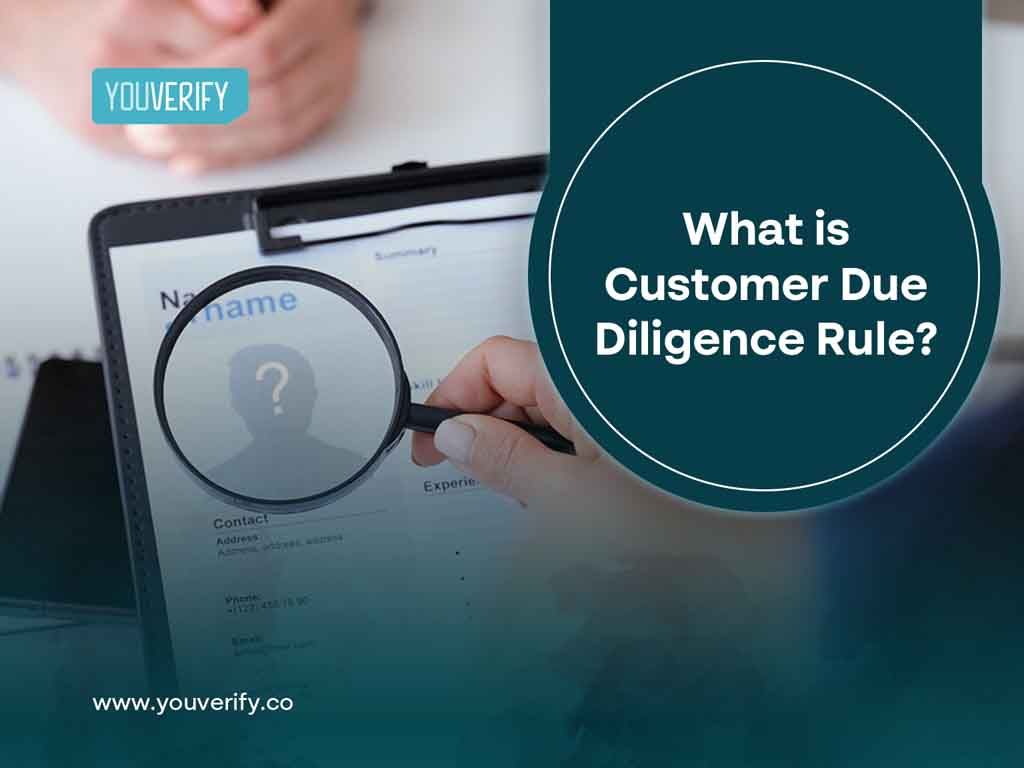It is always important to ascertain key information about a customer or a potential customer, and the customer due diligence rule guides that process. The CDD rule gives the customer due diligence process clarity and structure.
The main aim of customer due diligence is to collect relevant information or data about a customer during the onboarding process. This process prevents financial crimes, such as money laundering, fraud, identity fraud, tax evasion, etc.
What is the CDD Rule?
The Customer Due Diligence (CDD) rule is simply a regulation that obligates financial institutions to verify their clients' identities and to understand the nature of their relationships and business activities.
The new customer diligence rule, or the FinCEN customer due diligence rule, introduced in 2018, amends the regulations of the Bank Secrecy Act to improve financial transparency and dissuade criminals and terrorists from misusing companies as fonts to disguise their illicit activities and launder their gains from malicious or criminal activities. Hence, this rule directly affects CDD in banking, as it provides a framework to follow.
The new CDD Rule by FinCEN aims to clarify and strengthen the customer due diligence requirements available for US banks, mutual funds, brokers, or dealers in securities, futures commission merchants, as well as introducing brokers in commodities. The FinCEN CDD rule mandates financial institutions under the legislation to identify and verify the identity of the ultimate beneficial owners of legal institutions, that is, customers who own, control, and profit from companies when these companies open accounts.
Why is The CDD Final Rule Important?
Customer Due Diligence Rule Beneficial ownership or ultimate beneficial ownership is often shrouded to layer or cleanse money from illicit sources.
An ultimate beneficial owner (UBO) is the final individual who benefits from the proceeds of a company or who ultimately owns and funds the company. In order to counter these lapses, the new FinCEN customer due diligence rule provides structure or a framework through an implemented legislation to help effectively verify the authenticity and intentions of customers.
Reducing opportunities for anonymous and fraudulent financial transactions is an important line of defense against illegal or malicious financial activities. Financial institutions, following the CDD rule, minimize reputational and regulatory risks while building trust with clients. The CDD rule also ensures compliance with regulations and helps prevent significant fines and penalties for non-compliance.
Customer Due Diligence Recommendations for Financial Institutions
The FinCEN CDD rule has four key/core customer due diligence requirements. It mandates financial institutions subject to the rule to create and keep written policies and procedures that are rationally made to:
- identify and verify the identity of customers
- identify and verify the identity of the beneficial owners of companies opening accounts
- understand the nature and purpose of customer relationships to develop customer risk profiles
- conduct ongoing monitoring to identify and report suspicious transactions and, on a risk basis, to maintain and update customer information
Complying with FinCEN's customer due diligence rules may be quite tricky. However, it is advisable to be meticulous about data collection and record keeping. There are several ways to improve compliance with the FinCEN customer due diligence rule, and they include:
1. Comprehensive Identity Verification Systems
To comply with the FinCEN CDD Final rule, financial institutions should use advanced verification technology. This allows for a streamlined verification process that ensures efficient customer identification. Using trusted software compliance providers is important, as the identity verification software systems they provide can easily sift eligible customers from the customers that are not, and stop a crime, no matter how elaborate, even before it happens.
2. Adopting a Risk-Based Approach
Adopting a risk-based approach or strategy to compliance is wise because it tailors due diligence measures according to customer risk levels. Higher-risk customers, such as politically exposed persons, may require more scrutiny during verification and continuous monitoring, but lower-risk individuals may have much simpler procedures.
3. Automation Of CDD Procedures
Automating Customer Due Diligence steps can help improve accuracy, reduce operational costs, and provide real-time risk assessments, which is essential for the fast-paced fintech industry. Financial institutions should partner with reliable Regtech firms to provide efficient automated customer due diligence systems that are easily scalable and deliver fewer false positives.
4. Continuous Monitoring
Financial institutions should establish systems for continuous/ ongoing monitoring of customer transactions to identify and report any suspicious activities promptly.
Identifying and reporting to appropriate oversight bodies is crucial for compliance procedures.
5. Regular Training and Updates
Compliance teams should be frequently trained to stay updated on CDD requirements, especially as regulations and fintech risks change.
Partnering With Youverify To Comply With The New Customer Due Diligence Final Rule
Youverify, a reliable Regtech company, offers a range of compliance software products that automate customer verification procedures seamlessly. With Youverify, the customer due diligence process can be efficiently undertaken, reducing or mitigating malicious financial intent and financial disorders.
Products offered by Youverify are easily scalable, with customer support and training offered throughout the duration of the product use. Onboard customers safely and efficiently and mitigate financial crimes, from customer verification to ultimate beneficial owners screening to transaction monitoring.
To partner with Youverify, click here to get started or get a free demo here.
